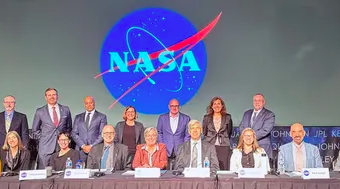
NASA has revealed that artificial intelligence and machine learning will play a crucial role in the search for extraterrestrial life and unidentified flying objects (UFOs). In their recently released 36-page report on UFOs, NASA acknowledged that they currently lack sufficient high-quality data to draw definitive scientific conclusions about the origins of these phenomena. However, they emphasized the importance of AI in identifying anomalies within large datasets.
NASA Administrator Bill Nelson stated during a briefing that AI will be utilized to search for anomalies in the skies and continue the exploration of habitable realities.
Dr. Nicola Fox, NASA’s associate administrator, further emphasized the significance of AI in uncovering hidden signatures within data, comparing the search for these signals to finding a needle in a haystack.
What is Artificial Intelligence (AI)?
“It is often the case that our data manifests as wiggly line plots. While we may find such plots intriguing, there are instances where we may overlook a signal amidst the wiggles,” she stated.
“Artificial intelligence enables us to identify signatures that may otherwise go unnoticed. For instance, we have been able to detect signatures of superstorms in data predating the advent of routine scientific satellite data, thanks to AI.”
The use of AI was a fundamental aspect of the report compiled by the independent UAP research team consisting of 16 members.
According to the report, the panel concludes that a comprehensive UAP detection campaign should incorporate sophisticated data analysis techniques, such as artificial intelligence and machine learning, alongside systematic data gathering and robust curation.
A map of UFO ‘hotspots’ has revealed a cluster of sightings that are connected to areas with atomic bombs and war zones.
Advocates have praised the potential capabilities of generative AI and its ability to propel society towards the next stage of human development. However, experts have warned that without proper regulations or in the hands of malicious users, it could also lead to a dystopian future.
Recently, more than 100 members of Congress met with prominent figures in the tech industry, including Elon Musk and Mark Zuckerberg, to discuss AI. Some senators expressed concerns about the lack of regulation surrounding AI.
The NASA panel was asked whether regulating AI would affect the agency’s ability to utilize this emerging technology in the search for extraterrestrial life. Senator Nelson dismissed concerns that regulations would hinder NASA’s mission, stating that any attempts by Congress to establish laws to regulate AI for other purposes would not impede their use of AI tools in addressing this specific issue.
Russian encounters with unidentified flying objects, a confidential report on the ‘Tic Tac’ phenomenon, and the discreet appearance of three significant individuals during a congressional hearing have gone unnoticed
Nelson dismissed apprehensions regarding the imposition of regulations that could impede NASA’s mission.
“In response to the inquiry, I do not believe that any efforts by Congress to enact legislation that would effectively establish safeguards for artificial intelligence for various reasons would in any way hinder our utilization of AI tools to aid us in our pursuit of this particular matter,” Nelson stated.
(According to Fox News)

